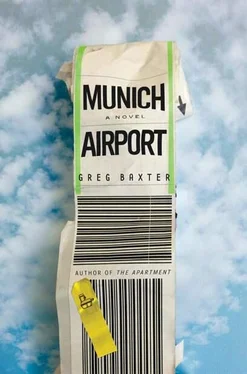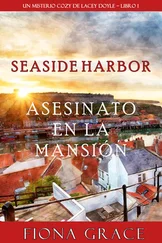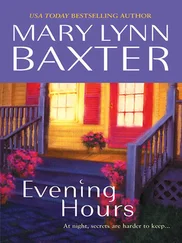He says, Yes, I have to get on that plane.
Can you lock the door behind me, when I go? I ask. I think so, he says. I tell him not to worry, I won’t be long, and I leave him. I close the door behind me, and I wait to hear him lock it. Then I wait to hear that he is sitting safely down again. I say, All good? All good, he says. The door of another stall opens — only two doors down — and a man starts to walk out. Then he sees me and pretends to have left something behind, something that makes him swiftly reverse, with embarrassment, and close and lock the door. The bathroom then goes very quiet. I can see that a handful of stalls are occupied — by the color of the locks on the doors — and I realize that everyone in those stalls is waiting for me to leave so they can dash away. They are in those stalls quietly panicking, not knowing what to touch, everything is contaminated, only their embarrassment keeps them from fleeing.
The morgue, in Berlin, was in the basement of a hospital. The hospital was an old building and it seemed like a dangerous place to be, a place that would make you sick if you stuck around. Beside every door there were hand sanitizers. You placed your hand below a sensor and a fine puff of alcohol spray came out, and you rubbed it into your hands. Even though I touched almost nothing, I sanitized my hands at every opportunity. I went alone. Trish had offered to come along, but I said I’d prefer to be by myself. There was a coroner and a witness, a police officer. The coroner was a man in his fifties with little glasses, a weak chin, a bad complexion, a lazy eye, and he was bald on top with closely cropped hair on the sides. I found him hard to look at, but not because of his appearance — it was that the place itself had infected him with dreariness. I was given some papers to fill out. I looked them over and said, I can’t understand any of this. They said the paperwork was essential. I’m here to identify my sister, I said, can I call the embassy and get them to help me with the paperwork afterward? The coroner spoke quietly to the officer for a few moments. The coroner was in charge, but I could see that he didn’t want to be. He wanted somebody else to take responsibility for altering the procedure. The officer, who was young, tall, blond-haired, muscular, who wore a stiffly starched uniform, and who wore a sidearm — and who was probably quite inexperienced — refused to accept the responsibility. The coroner finally agreed to let me see the body. He said it would be an unofficial identification. I asked him what that meant — would I have to come again? No, he said, it would be sufficient once the paperwork was completed. I was taken into a room that had a glass window. Through the window I could see another room, which was dark. The officer stood just behind me, ready, I guessed, to catch me if I fainted. The light in the other room came on. It was a blue-green light. The tiles on the wall were blue-green — I suspected they were white, and the light gave them color. The coroner, who wore a face mask and protective glasses, wheeled in a gurney with a body under a blanket. Suddenly I thought I was going to lose my nerve, I was going to be sick, I wasn’t ready, I’d never done anything like this. The coroner stepped away from the gurney and the body and pressed a button on the wall, and his voice came through. The officer then said to me, in English, Shall we proceed? Yes, I said, please proceed. The officer pressed a button on our side of the glass and told the coroner to proceed. The coroner pulled the blanket down to just below Miriam’s neck. He held the blanket and did not step away. I nodded and he immediately pulled the blanket back over her head. I turned around. The officer, who was averting his gaze, said, Okay? Okay, I said. I really needed to be alone, but I had to sit in an office and meet the coroner again, and then I called Trish and she got the paperwork faxed to her for me to complete later. And then I went outside and, for no reason I know, hopped on a bus that looked empty and sat in the back and rubbed my eyes. She had almost no hair. Miriam’s head was almost hairless. Her head seemed shrunken, and this made her nose seem gigantic. Her ears, too, looked oversized. The light in the room prevented me from seeing the color of her skin, but the texture was claylike, striated, and stretched. Her cheeks were pulled back in a way that gave her a ghoulish smile. If I had not seen her five years ago, when she was already painfully thin, I would not have recognized her. Actually, I didn’t recognize her right away. But I finally recognized something in her closed eyes, an expression quite at odds with the torment that had expressed itself all over her face and head and neck. I think I saw surprise, surprise without fear. Or else I have been gradually altering the memory ever since, possibly to make the image easier to bear, as I carry it forth forever, or possibly to extend to her a reward for her courage, to decorate her troubled memory with a millionth of a millionth of a second of grace.
Outside the bathroom, Trish is waiting with our carry-ons. She is facing away from the entrance, looking toward the windows behind where we were sitting, past the history exhibit — staring at the tarmac, or the brightness, or the city hidden in the distance, or the mountains far beyond the city. I get her attention. I put my sunglasses back on. I grab my carry-on and my father’s carry-on and start to walk. She walks beside me. She knows what we need to do — she saw the floor in the bathroom — but we don’t need to speak of it. I go a little faster than my normal pace, and she keeps up. I tell her I can’t believe how much farther we have to travel today.
Will your dad be okay? Can he make the trip?
He’ll make it. I’m not sure if he’ll survive the flight, but he’s getting on that plane.
We are moving fast and I tell Trish I need to slow down. I feel sick, my head is spinning. Trish asks me if I’m going to be okay. I ask her if I look green again and she says no, I look translucent. I am sweating but I am ice-cold. I think my glands are swelling up. I have a headache in my teeth and jaw. I feel fine, I say, I feel like a million dollars. We stop at a departures board and check for Atlanta. Our flight is scheduled, at last. There it is — Go to Gate. Trish checks the time on her phone. I check the time as well. Considering all that lies ahead of us, we do not have a lot of time.
Though I cannot speak for my father, it was easy for me, in the beginning, not to eat. For the first forty-eight hours after our return from Aachen, I simply had no appetite. We went out drinking that first night, and I felt nauseous until I had quite a few drinks, and on the way home I thought about getting a kebab or a pizza slice, but I didn’t, because I knew I wouldn’t keep it down. That was when we met the man sitting on the curb and sang him Happy Birthday. He was English. I’ve lost me mates, he said. He didn’t know what hotel he was staying in. He didn’t know where he was. But he wasn’t too worried. And after we sang to him, he cheered up and decided to go find a bar he could drink in all night. I think we hugged him. I can’t remember how old he was. He was probably twenty-one. I think he tried to convince us to come along with him, but we were absolutely finished. I hadn’t been drunk on consecutive nights for many years, and suddenly I found myself hanging on to life at the end of a nine-day binge. When I woke the next day, I felt truly terrible. I felt as though my insides had liquefied. I couldn’t get back to sleep. I was wide awake but unbearably tired. I got up, showered, and went to sit on the couch. My father was up, too. Neither of us was in the mood for breakfast, or even coffee, and we didn’t have the energy to speak. It was too cold to sit outside on the terrace. It was obvious that a period of pure waiting had begun — and apart from one last trip to Miriam’s apartment, and a night out with Otis and Miriam’s friends, that was what I did. I waited. I walked around and listened to music. I cycled. I stood outside cafés. I sat on benches. And as my appetite slowly returned, I staved off hunger pangs. Perhaps, if I had been in London, I’d have started eating sandwiches. In London, I might not have made it through that second day, and there never would have been a question of deciding not to eat. But in Berlin, they have no sandwiches. They have these things that are like sandwiches, but they are not sandwiches — the bread is wrong. And the only thing I could have eaten at that point were sandwiches — bland, familiar, prepared sandwiches from supermarkets or sandwich shops. I sat on the couch, checked the time, then stared out the window at the sleet, or just the gray, and thought of how far away London seemed to be, how unreachable, as though I would have to travel back in time to get there. Everything in my life would instantly dematerialize if I were dead. All my possessions would vanish. All my notes would be erased. All my debts would drift away. My remains would become nothing more than impediments to others — banks, bosses, an incoming tenant. But I did not have to die. I could just go live at home. I could work with my hands, I thought, renovate houses, lay roof, learn to drive a backhoe, find work shoveling on a horse ranch, buy a tiny fishing boat, meet a woman twice divorced.
Читать дальше











